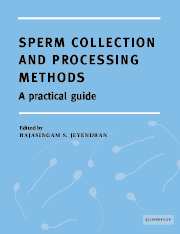Conclusion
Published online by Cambridge University Press: 11 March 2010
Summary
Male fertility issues plague over 40% of couples experiencing procreative difficulties. Problems with the male reproductive system can involve compromised sperm quality, anatomical and physiological irregularities, or hormonal deficiencies. Fertility specialists are now able to combat and treat many of these fertility concerns through a host of clinically proven methods.
Specifically, therapeutic methods for successful male fertility treatment focus on optimization of sperm procurement. Whether sperm are procured directly by the patient, with clinical or even surgical correction, the fertility specialist's goal is acquisition of as many viable spermatozoa as possible. Once an optimal number of sperm have been procured, various laboratory methods can then enhance sperm quality, making it suitable for intrauterine insemination techniques.
In other cases necessitating intervention by the clinician, sperm are aspirated directly from the male reproductive tract. Once a sufficient number of viable spermatozoa have been procured, procedures such as intracytoplasmic sperm injection (ICSI) can then be performed.
In fact, sperm procurement and processing methods have become sophisticated to the point of delegating even azoospermia to the history books. Azoospermic ejaculates can now be pelleted to extract a few sperm using high-g force centrifugation, suitable for ICSI procedures. Fertility specialists can also aspirate sperm directly from the testes. Cases of arrested spermatogenesis no longer result in sterility: spermatids may be harvested ex vivo and further processed in the laboratory for use in assisted reproductive techniques.
- Type
- Chapter
- Information
- Sperm Collection and Processing MethodsA Practical Guide, pp. 154 - 155Publisher: Cambridge University PressPrint publication year: 2003



